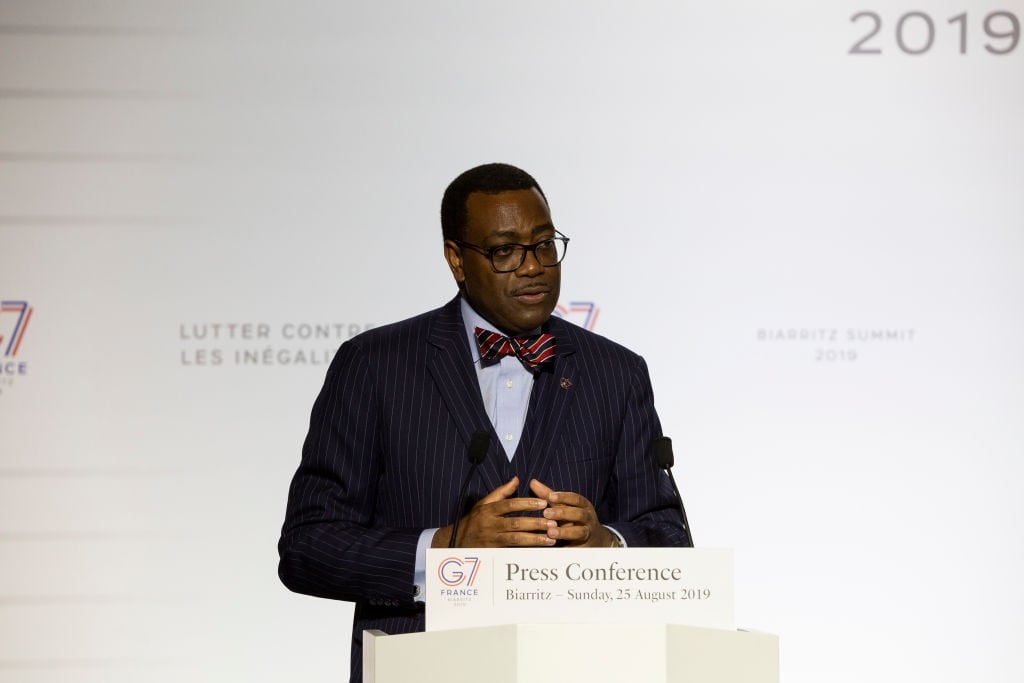

African Development Bank President Akinwumi Adesina.
Rita Franca/NurPhoto via Getty Images
- Developed nations pledge of R2 trillion a year climate finance for developing nations still to come.
- In six months, world leaders will meet at the Cop28 summit in Dubai, but Africa continues to suffer climate change impact with no respite in sight.
- The African Development Bank says Africa should increase private sector funding in the fight against climate change.
With less than six months to go before the next Conference of the Parties (Cop28) at the Expo City, in Dubai, developed nations are yet to honour their R2 trillion ($100 billion) a year climate finance pledge made to developing countries.
For African Development Bank Group (AFDB) president, Dr Akinwumi Adesina, “Africa is being short-changed in climate finance. Africa is choking,” he said, addressing journalists in Egypt’s resort city of Sharm El Sheikh at the week-long Bank Group’s 2023 annual meeting.
Part of the bank’s mandate at the annual meeting was to come up with a strategy to mobilise private sector funding for Africa’s climate change and green energy transition.
The impact of climate change in Africa cannot be overemphasised.
Adesina gave an example of how, in the Sahel region, climate change was impacting food production.
READ | COP28 chief says fossil fuels have role to play
“In the Sahel, hotter temperatures are drying up limited water, causing water stress for crops and livestock and worsening food insecurity,” he said.
Of the R590 billion ($29.5 billion) in climate change finance in Africa for 2020, just 14% came from the private sector.
This chunk covers developed economies, namely South Africa, Nigeria, Kenya, Morocco, and Egypt.
Private sector financing in Africa is lower than in other parts of the world.
In Latin America and the Caribbean, private sector funding constitutes 49%, it is 37% in South Asia, East Asia, and the Pacific.
Some of the efforts from the private sector to promote climate change on the continent include constructing environmentally friendly infrastructure, cutting back on energy and water use, enhancing community and urban climate resilience, and preserving ecosystems and natural resources.
Adesina projected that Africa would need R54 trillion ($2.7 trillion) by 2030 if the continent was to properly finance its climate change needs, and a lot of transformation would take place.
“If Africa had that money, the Sahel would have electricity. If Africa had that money, we would recharge the Chad basin, which has provided livelihoods for millions of people in Chad, Nigeria, Niger, and Cameroon. Everything will change in all those countries; we will green the Sahel. We will ensure every single African country is protected against catastrophic weather events,” he said.
Last week in Johannesburg, the chairperson of the Committee of African Heads of State and Government on climate change, Kenyan President William Ruto, said Africa had the natural resources to address the global climate change issue.
However, the continent needed support.
“Africa has 30 to 40% of the world’s minerals, including those on which the green energy transition depends.
“Our continent has the potential to remove over 300 million tonnes of CO2 per year through nature-based solutions.
“At a carbon price of US dollars, 50 per tonne could provide in excess of 15 billion US dollars in revenue, create more than 85 million jobs, and improve millions of livelihoods.
Should climate protection be a priority, even if it means sacrifices by citizens? Sign up for our global dialogue programme and get matched for a conversation
“We are telling the world that we have our assets, and we are willing to have a win-win engagement. We have the largest green energy potential resources,” he said, giving the keynote address at the 3rd Pan-African Parliamentarians Summit on Climate Policy and Equity.
Adesina said: “Africa’s measured natural capital alone is estimated to be worth $6.2 trillion, which, if well harnessed, can spur rapid economic growth and wealth generation.”
The 58th Annual Meetings of the Board of Governors of the African Development Bank and the 49th Annual Meetings of the Board of Governors of the African Development Fund began on 22 May and they end on Friday.
The News24 Africa Desk is supported by the Hanns Seidel Foundation. The stories produced through the Africa Desk and the opinions and statements that may be contained herein do not reflect those of the Hanns Seidel Foundation.
